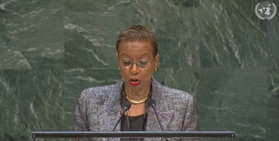THE FBA SDNY UNITED NATIONS REPORTER SERIES
By Alex Wang[1]
FBA UN Reporter
November 20, 2019
On October 31, the General Assembly held their 22nd Plenary meeting at which they discussed the UN’s Economic and Social Council’s (ECOSOC) most recent report, issued on July 26, 2018. In a speech by Inga Rhonda King, a retired teacher, accountant, and publisher, who had assumed the role of the President of ECOSOC in July, 2018, she noted that the work of the ECOSOC was not on track to achieve its goals ahead of the UN’s Sustainable Development Goals (SDG) Summit, scheduled for September 24 & 25 the following year. She noted that, if some changes were made, that goal could still be met.
The annual ECOSOC Report was created for the purpose of focusing on the social and economic inclusiveness of all people. In order to create and “strengthen the capability of their institution to maximize the synergy demanded by the transformative agenda.” She noted that since its inception, 49 nations had voluntarily came forward and worked together to try and achieve this common goal.
Throughout the course of ECOSOC’s development, the participating nations were once again reminded of the impact of growth on all SDGs and the importance of ECOSOC as an institution working to create meaningful and long-lasting transformations. The report also touches on areas of climate change, and the disproportionate impact natural disasters have on smaller countries. It talks about the financial and economic loss suffered by the larger countries verses the fatal, catastrophic and devastating effect is has on smaller nations. The report demands better responses to natural disasters and the creation of more preemptive measures in place as opposed to simply being responsive after the disasters – such as with “longer warnings and quicker responses.”
She pointed out the usefulness of the annual report because it allows ECOSOC to keep track of its progress and in order to decide what changes should be made to the next set of reports. She pointed out the possible introduction of plans for a “circular economy” where waste and pollution does not exist.
The President concluded her speech with a quote, summarizing perfectly the organization’s purpose: “ECOSOC serves as the destination of choice for solid analysis and policy recommendations to support accelerated action for the sustainable development goals.”

[1] Alex Wang is an LLM Student at Fordham Law School Studying ‘US Law’. He is scheduled to graduate in May 2020.